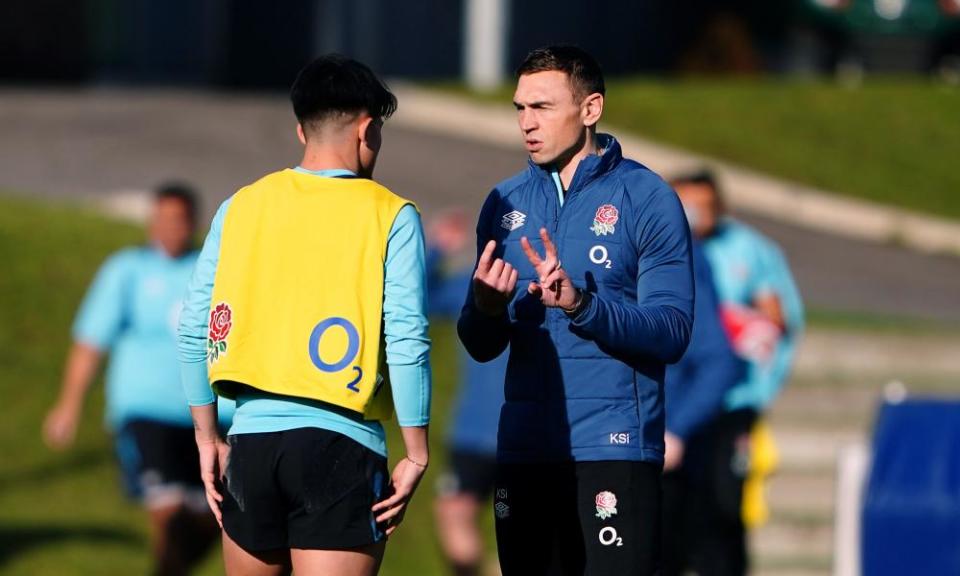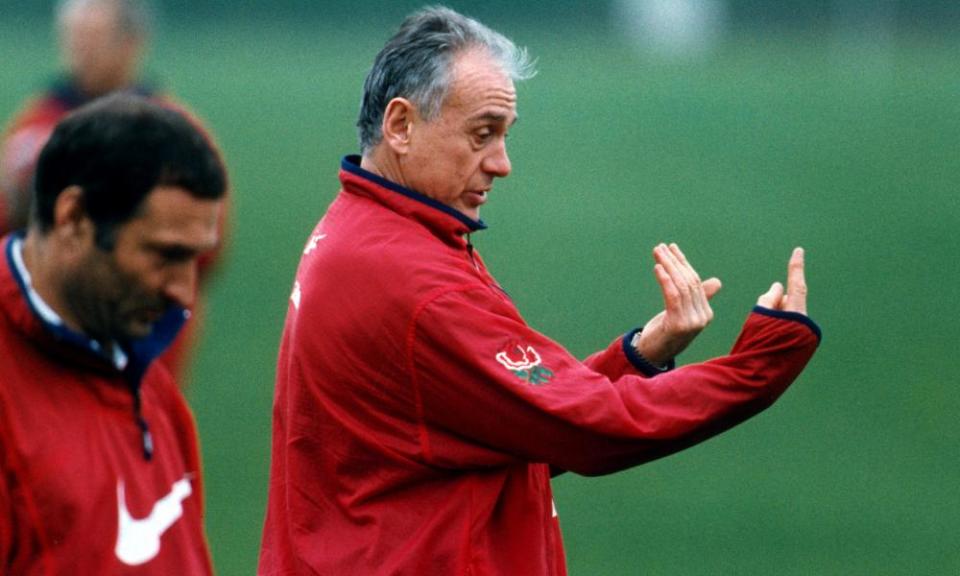Codebreakers could hold the key as league exiles plot Six Nations glory

Kevin Sinfield’s journey from rugby league to England defence coach is, by now, a route well travelled. Admittedly Brett Hodgson’s tenure was remarkably brief but the records now show Sinfield is the third in a row to make it. With Andy Farrell guiding Ireland to No 1 in the world, Shaun Edwards making such an impact with France and Mike Forshaw recruited by Wales, this is shaping up to be a Six Nations defined by coaches whose careers began in the other code.
At first glance it is a trend traced to the north-west of England but it is one that might never have happened without a chance encounter in Hawaii between the San Francisco 49ers and an Australian known as “Supercoach”. The coach in question was Jack Gibson, renowned for his success with the Parramatta Eels in Australian rugby league in the early 1980s – around the time the “Invincible” Kangaroos swept all before them under Frank Stanton.
Related: Six Nations 2023 guide: France and Ireland look the teams to beat
At this point it is probably best to introduce Phil Larder. He was the original as far as England are concerned. He had already coached England and Great Britain in league when in 1997 he was recruited by Clive Woodward, and he has a 2003 World Cup winners’ medal and two British & Irish Lions tours to his name. In short, he was the pioneer who paved the way for Sinfield and co to follow.
Back in the 1980s he was director of coaching for the Rugby Football League and was sent to Australia on a fact-finding mission. Money well spent, it turned out, after he became close with Gibson, who had by this stage already hit it off with the 49ers coach Dick Nolan.
“It all started with Jack going on holiday with his wife to Hawaii,” recalls Larder. “He got pally with Nolan, who invited him over to watch training. When he was in the dressing room, some went left and some right. Jack said: ‘Which is the first team and which is the second team?’ And Nolan said: ‘They’re both first-team, it’s the offence going left and the defence going right.’ He had never seen a defensive session being done before. I’d played rugby league professionally for 15 years and never had a defensive session.
“The RFL later paid for me to go and watch Frank Stanton with his team. Then I got pally with Jack. I learned so much then and when I came back I introduced defence into every coaching course and it gradually fed through rugby league at the time when nothing was taking place in union.”

Larder’s name has come up a number of times recently. He was mentioned by Eddie Jones when explaining the appointment of Hodgson and by Sinfield both times he has spoken publicly since joining England. Sinfield went to Saddleworth school in Oldham, where Larder taught PE for 16 years. He did not teach Sinfield but he remains close with Eddie Barton, who did, and it is telling Larder was the man to whom England’s new defence coach turned for advice when making the transition to union.
So what is his best advice now? “Do a hell of amount of analysis. On his own players and on the opposition, which he will find far more testing at international level compared to Leicester. You’ve got better players coming at you and better coaching up against you.”
Larder even has a pertinent example to illustrate. “Australia had just appointed Eddie. I didn’t know anything about Eddie at the time but we had two Australians playing for us at Leicester [where Larder also coached]. They said he’s a fabulous coach and his main idea was that if Australia keep the ball for three minutes, it doesn’t matter what the defence is like, it will lose shape because the defenders will be tired. So I adopted a four-minute plan. In training [forwards coach Andy Robinson] ran players against us and they would keep the ball for four minutes. The first few times we were absolutely knackered but gradually we got there and we coped with Australia.”
Larder lets out a laugh when asked if, given he was the first cross-coder to coach defence, there was any scepticism among the hardcore unionists he was preaching to. By the time he was seconded by Graham Henry for the 2001 Lions tour of Australia, however, “my phone never stopped. I’d have the Welsh, Scottish, Irish, French, phoning me to recommend a rugby league guy who could coach defence.”
To demonstrate how foreign a concept coaching defence was around the turn of the century, Larder adds: “When I went on the Lions, we had to have an extra coaching session for those selected from Wales, Scotland and Ireland because none of them had done a defensive session before.”
In the early days, Woodward encouraged Larder to appoint a defensive captain and it was Neil Back – “very fit, great in defence and a great work ethic” – he chose for the role. It is no surprise, then, that Sinfield already has his defensive captain in mind even before England convene for their first full session. Indeed, Larder has no doubt Sinfield will be a hit but is eager to see the new management given time before they are judged.
He recalls how some senior figures at the Rugby Football Union wanted Woodward gone after the 1999 World Cup but how it was not until the 2000 tour of South Africa he felt progress was made. “I did it gradually, I took it step by step. At first the forwards were just being coached to follow the ball whereas I wanted them to form a defensive line from one side to the other. It can’t just happen in a day, or in a season.”
Back to the present day and you sense it gives Larder great pride to see France and Ireland as the standard-bearers of international rugby with such influence from Edwards and Farrell – whom he made Great Britain’s youngest ever captain. Sinfield is just starting his international journey, but can he reach those heights with England? “The most important things are your own personality and your man-management. Kevin will hit 10 out of 10 on both of them. He’ll immediately get the respect of the players and he’ll keep it because his man-management skills are so good.”

 Yahoo Sport
Yahoo Sport 





































